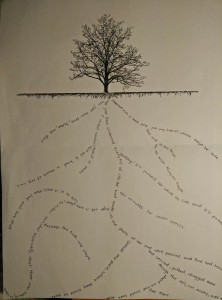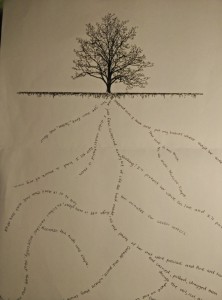The need for possession is a reoccurring theme in the book Beloved by Toni Morrison that gives readers an insight to the turmoil and pain experienced during the time of slavery. This theme is ironic because as a slave, the characters in the story possessed nothing, being the possession of someone else. There is a need to own something of their own even though they do not even hold possession of themselves. This can be seen in the pivotal passage in Beloved that occurred on pages 192-193 when Paul D finds out what exactly happened in 124 and what Sethe has done in the house. The story of Sethe actually begins with the killing of her own daughter in order to protect them from going back to the Sweet Home under the watch of the schoolteacher. Without this killing, there would not be a haunted house that confined both Sethe and Denver. The ultimate need for possession can be seen with Sethe’s infanticide in order to keep her children for herself.
Sethe justifies her murder by saying, “I stopped him, I took and put my babies where they’d be safe” (Morrison 2004: 193). In this pivotal quote, readers can see that Sethe went to ultimate measures to claim what is hers. She wasn’t willing to give away that claim to the schoolteacher. And now, Beloved will always be hers only, and no one else. Only in Sethe’s possession would her children be safe from the schoolteacher and his nephews. This was a pivotal part of the story because it’s what drives all the events that happens afterwards while also explaining the turmoil of slavery to be in possession of someone else and how this turmoil makes you want to hold on even more to that little bit that you do own.
This sort of possession and love was chastised by Paul D when he says, “your love is too thick” (Morrison 2004: 193). Toni Morrison also explains that, “suddenly he saw what Stamp Paid wanted him to see: more important than what Sethe had done was what she claimed” (Morrison 2004: 193). To claim something is dangerous in the slavery world because their claims are never forever and that is why Paul D calls it too thick. Throughout the story, we see the characters trying to claim something. They could never claim anything because they were slaves, they couldn’t even put a claim on themselves. Paul D, Denver, and Beloved wanted to claim Sethe’s love for themselves. They’ve never known what it feels to hold a claim on something and they each have this thirst to finally claim something.
Another claim that can be seen was Sethe’s continuous claim to her daughter after she has died. Sethe gave “ten minutes for seven letters” (Morrison 2004: 5). This stood out to me a lot because it is the first look at how much she loved her children. It never explicitly tells the reader what exactly this line means. But it is implied that she was willing to give the engraver ten minutes of sexual pleasure in exchange for the 7 letters of ‘Beloved’ to be engraved on her baby daughter’s tombstone. It brings to mind the lack of independence Africans had before and after the Civil War. Names are independent for each individual. When her daughter died, she is only referred to as “Beloved” in the story and never by her actual birth name. I feel that ‘beloved’ is a word of ownership. You have to be someone or something’s ‘beloved’. In this way, her daughter will always be hers and will always stay with her.
The possession Sethe claims of her daughter can also be seen when Paul D complains about Sethe babying Denver. When Sethe apologizes for Denver, Paul D says, “It means she has to take it if she acts up. You can’t protect her every minute. What’s going to happen when you die?” (Morrison 2004: 54). In response, Sethe says “Nothing! I’ll protect her while I’m live and I’ll protect her when I ain’t” (Morrison 2004: 54). In this quote, Sethe explains her claim to Denver and how even if Sethe can’t protect Denver physically in person, she will still be able to protect her. This passage foreshadows Sethe’s claim to Beloved and what measures she will take to protect her children. This is why she exclaims that she will protect her daughters no matter what, dead or alive.
No matter how much Sethe tried to claim what is hers, such as her children, she was still claimed by her past as a slave. Paul D says, “It occurred to him that what she wanted for her children was exactly what was missing in 124: safety” (Morrison 2004: 193). In a way, I feel that the author Toni Morrison is telling the readers that no matter how hard Sethe tried to run from the Sweet Home and cruelty of slavery, she will never be able to be a true free woman. She is still claimed and possessed by her past even though she is no longer a slave. This resonates with the readers when thinking about racism and prejudice in the world today. Even though slavery has ended and people are advocating for equality, there is a chance that it may never be achieved no matter how hard we try. Africans will always be possessed by the turmoil their ancestors must’ve felt in slavery, and probably their own turmoil of racism.
The theme of possession is a struggle that can be seen throughout the story between Sethe’s hold on her children and slavery’s hold on Sethe. Of course the beginning of this turmoil is the beginning of slavery, but when Sethe tries to kill all her children in order to put a claim on them, readers are able to understand the pain and thought process of people in the time of slavery. Infanticide can be seen as an exit to slavery, a sort of blessing or safety for a mother. Sethe believes that death is the only escape for her children to the cruelty of slavery. This allows readers to see the negativity of slavery besides what the naked eye can see such as physical abuse. Slavery is seen as something that is worse than death, something that could affect their kin several generations down. We are still experiencing the aftermath of slavery whether it is racism or prejudices. This brings to mind the question: when will slavery’s possession on civilization ever end?





